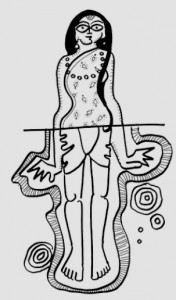Shikhandi, or Other Stories They Don’t Tell You, by Devdutt Pattanaik, explains that queerness isn’t only modern, Western, or sexual. Rather, by looking at the vast written and oral traditions of Hinduism, Pattanaik finds many overlooked tales with queerness at their center, some over two thousand years old. There’s Shikhandi, who became a man to satisfy her wife; Mahadeva, who became a woman to deliver her devotee’s child; Chudala, who became a man to enlighten her husband; Samavan, who became the wife of his male friend — and many, many more. Pattanaik recounts these stories with his own illustrations, exploring the importance of mythologies in understanding the modern Indian mindset. Released in India in 2014 by Zubaan Books in collaboration with Penguin India, Shikhandi is now available in North American markets through University of Chicago Press. An excerpt is shared below by permission.
Narada, who forgot
he was a man
From the Bhagavata Purana

Narada once asked Krishna the meaning of maya. Krishna said, ‘It is better experienced than understood. Come let’s ride into the forest in my chariot.’
After riding deep into the forest, Krishna said, ‘I am thirsty. You look thirsty too. I can hear a river flowing beyond the trees. But I am too tired to walk there. You go to the river, quench your thirst and get some water back for me. But before you drink the water make sure you bathe.’
Narada walked to the river. It was farther than he had assumed it was. By the time he reached the waters he was so thirsty that he drank the water forgetting to first take a bath as instructed by Krishna. As a result he turned into a woman, a beautiful woman.
A man saw Narada, the woman, and fell in love with her and begged her to marry him. Narada was so enchanted by the flattery that he agreed. The two lived a happy married life and had sixty children.
But then there was an epidemic that claimed the lives of her husband and her children. Narada was miserable. She felt she should kill herself. But then suddenly sorrow was replaced by ravenous hunger.
She smelt the sweet smell of a mango from the tree near her house. She stretched out her hand to fetch it but it was out of reach. So she dragged the corpses of her husband and children, climbed on them, plucked the fruit and was about to eat it when a priest appeared and told her to at least take a bath before eating the fruit as she had been contaminated by touching dead bodies.
So Narada entered the river to take a bath, keeping the hand holding the mango above the water, for she feared the force of the water would wash the mango away. When she emerged, she was a man once again but the hand holding the mango still had the bangles she wore as a woman.
Suddenly he remembered all that had happened. The priest who had asked her to take a bath was Krishna himself, ‘See how you forgot all about me and my thirst and my instructions to take a bath before drinking the water. See how once you became a woman you enjoyed the attention of a man and then the attention of your children. And when they died, you forgot about them to satisfy your desire for the mango fruit. This is maya, delusion produced by desire, that makes you forget everything except the pursuit of self-gratification.’
Having learned his lesson, Narada dipped the female hand with the mango in the water and it came up as a male hand; the mango turned into his lute.
~ ~ ~
❉ The Bhagavata Purana was in all probability composed in the southern part of India between fifth and tenth centuries CE.
❉ The idea of men turning into women and women turning into men after a dip in a pond or a river is a recurring motif in Hindu mythology, found both in the Sanskrit Puranas and regional oral traditions. Sometimes the transformation is a boon, for example a woman is saved from a potential rapist or she can finally marry a female lover, or he can marry a male lover. At other times it is a curse. But often it is a chance to experience the world from another’s point of view and discover wisdom.
❉ This story links desire (kama) with delusion (maya). As monastic orders rose in India, sexual pleasure was frowned upon. Homosexual desire, that has no reproductive component in it and is all about indulging desire, came to be seen in a negative light.
❉ Shiva, the patron of all hermits, destroys Kama, the god of lust, with the glance of his fiery third eye. But then the Goddess in the form of Kamakhya (whose eyes embody Kama himself) pacifies him, turns him into her husband, and in that capacity Shiva explains the art of making love that is transmitted through his bull Nandi to humankind. A fragment of that knowledge is now called kama-sutra, the manual of lovemaking.
* * *
Devdutt Pattanaik is a renowned author, mythologist, and leadership consultant. He has authored over 30 books. Many of his books have been translated in Hindi, Tamil, Telugu, Gujarati and Marathi. Trained in medicine, Devdutt spent 15 years in the healthcare industry. He is a Mumbaikar who speaks English, Hindi, Odiya and Marathi.












